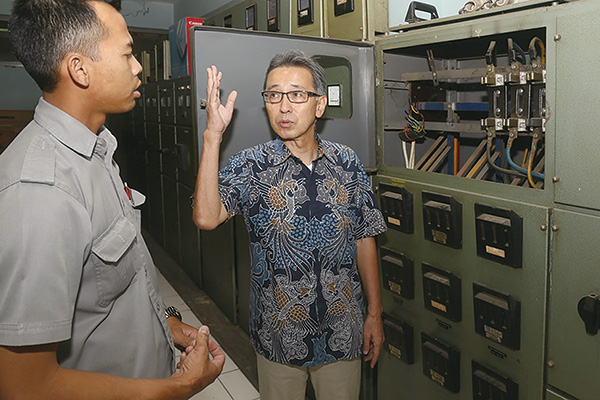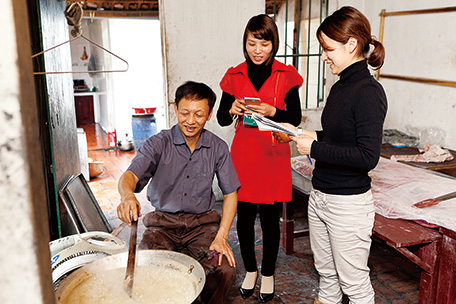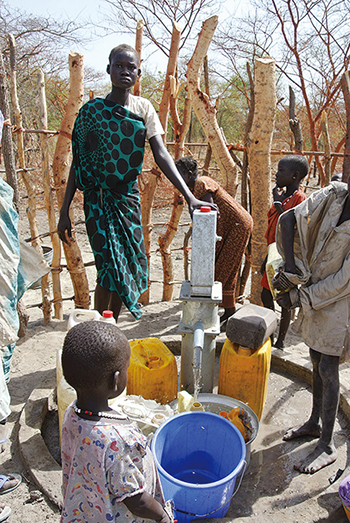Chapter 2 Cooperation with Civil Society

An employee of a Textile Centre in Bandung City in Indonesia’s West Java province receives training from Senior Volunteer Mr. Hiroshi Fukayama on energy conservation diagnostics at textile plants. (Photo: Perry Leksono)
The Ministry of Foreign Affairs (MOFA) and the Japan International Cooperation Agency (JICA) are committed to enhancing public participation in a variety of ways, including: encouraging discussions and dialogues regarding development cooperation; promoting development education; disclosing information regarding the status of development cooperation; and disseminating relevant information to a wide spectrum of people, including the population in rural areas. In addition, opportunities are offered to a range of Japanese nationals to participate in actual assistance activities in developing countries, thereby gaining first-hand experience in development cooperation. Notably, it is becoming more important to carry out development cooperation through closer coordination with civil society. Examples include JICA’s volunteer activities, such as the Japan Overseas Cooperation Volunteer (JOCV) and Senior Volunteer (SV) programs, and collaboration with NGOs for the provision of emergency humanitarian assistance.
The JOCV program is a participatory program in which Japanese men and women aged 20 to 39 are dispatched to developing countries for a two-year period, in general, to support the countries’ economic and social development while living and working with the host community. Celebrating its 50th anniversary in 2015, the JOCV program is an example of “Visible Japanese Assistance” that has been highly appreciated overseas. On the other hand, the SV program is also a participatory program where Japanese men and women between the ages of 40 and 69 engage in activities that benefit developing countries, drawing on their wide range of skills and abundant experience. The SV program is considered to be the JOCV program for seniors. In these volunteer programs, Japanese volunteers engage in development work in cooperation with the host community in developing countries, which deepens the host community’s sense of connectedness with Japan and creates grassroots-level friendships between Japan and these countries.
A good example of the active engagement of JICA volunteers is the activities to preserve the historic landscape of Duong Lam Village in Northern Viet Nam. Located approximately 60 km from the capital city of Hanoi, Duong Lam Village, surrounded all around by paddy fields, is home to a nostalgic Vietnamese landscape featuring houses with light brown wooden walls and honeycomb brick paths with the drifting smell of burning rice straw. This traditional landscape was considered a potential key tourism resource for Duong Lam Village. Therefore, JICA and the Office of Duong Lam Ancient Village Management and Preservation Board commenced a project to preserve the village’s landscape from early 2007. “Preservation of cultural property” and “tourism development” are complementary. If cultural property cannot be preserved, it cannot attract tourists. Conversely, if there is no increase in revenue from tourism, preservation of cultural property will be difficult. “Revenue increases” were needed to motivate people living in historic buildings to give up “renovations to turn them into more convenient housing,” and cooperate with the “preservation” of the houses. In this connection, JICA volunteers with different expertise were dispatched. For example, a JICA volunteer dispatched in the “architecture” category shared techniques for restoring historic buildings without losing their value as cultural property.

Ms. Haruka So, a Community Development Officer, conducts an interview at a candy factory in the Duong Lam Village in Viet Nam for the making of festival signs from candy. (Photo: Yuki Kato / JICA)
Meanwhile, volunteers with “business” know-how offered ideas and gave technical guidance for tourism development. Thus, JICA volunteers who were dispatched to Duong Lam Village squarely addressed both aspects of “preservation of cultural property” and “tourism development.” As of 2015, a JOCV from JICA is on dispatch to the Office of Duong Lam Ancient Village Management and Preservation Board. The JOCV and local staff are working to repair and manage the private houses that are cultural properties designated by the city of Hanoi (designated private houses), as well as plan and promote local development.
The Government of Japan undertakes various initiatives through JICA to promote participation in these volunteer programs. For example, the government has traditionally provided career support to volunteers who have returned to Japan from overseas, including support for finding employment. Furthermore, the government proactively conducts outreach and other activities to encourage people to take greater advantage of the “career break” system,(Note 1) which allows people to become JICA volunteers without quitting their jobs. In this manner, the government facilitates people’s participation in volunteer programs.
A different example of participatory development cooperation is the activities of Japanese NGOs. NGOs implement quality development cooperation activities in developing countries and regions in various sectors, including education, health, agricultural and rural development, assistance for refugees and internally displaced persons (IDPs), and technical guidance for landmine disposal. NGOs’ strengths lie in their attunement to local situations in developing countries and ability to carefully tailor their responses to the assistance needs of the host communities—assistance at the grassroots level that copes with local needs that are difficult to be addressed through assistance by governments and international organizations. In sites affected by conflict or natural disasters such as earthquakes and typhoons, NGOs provide prompt and effective emergency humanitarian assistance.

People gather around a well with improved sanitary conditions. (Photo: PWJ)
An example is the water supply and sanitation assistance in Jonglei State in South Sudan implemented in 2012 by the Japanese NGO, Peace Winds Japan (PWJ), as part of emergency humanitarian assistance, with financial cooperation provided by the Japanese government through the Japan Platform (JPF).(Note 2)
After gaining independence in 2011 following a civil war that lasted for over two decades, South Sudan is undergoing a state-building process that is rebuilding the lives of its citizens. However, water supply facilities remained broken due to the effects of the civil war, causing an absolute shortage in boreholes, while refugees began to repatriate to South Sudan from neighboring countries. As a result, securing sufficient access to safe water became difficult in many areas, including Jonglei State, and this in turn gave rise to sanitation problems.
To rectify this situation, PWJ, with support from the Japanese government, provided assistance for communities to repair and build boreholes, as well as establish water management committees comprised of community members. After the boreholes were completed, PWJ provided training through the community members’ water management committees for the maintenance and management of the boreholes by the community members themselves. Through these efforts, safe water became accessible in Jonglei State, improving the sanitary living conditions of the people. In addition, PWJ provided supplies to IDPs who fled the clashes between the government and anti-government forces, built latrines at schools and clinics, and held sanitation workshops, among other activities.
- Note 1: The career break system refers to a system in which personnel of companies, national or local governments, or schools participate in the JOCV and SV programs by taking advantage of such arrangements as “leaves” and “waiver of duty of devotion to service,” thereby remaining affiliated with their organizations.
- Note 2: A non-profit, emergency humanitarian aid organization established in 2000 through a partnership among NGOs, the government, and the business community.
